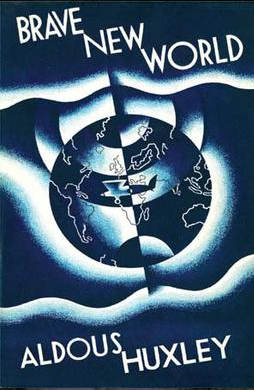
Brave New World by Aldous Huxley
In Brave New World, future fiction legend Aldous Huxley imagines a world where technology has made possible the genetic breeding of humans, assuring that all citizens will passively obey every wish and stricture issued by an authoritarian government. Life is pain-free but meaningless. “But while other dystopian novels portray totalitarian measures like surveillance and torture, Brave New World, in contrast, argues that the most powerful totalitarian state would be one that doesn't suppress and frighten its citizens. Instead, it manages to convince its citizens to love their slavery,” says the website many a college freshman goes to for help in fathoming such weighty assigned reading, LitChart.com. By imagining babies born in test tubes --decades ahead of the reality -- and then extrapolating the premise into such a deeply layered and socially charged novel, Huxley gave us a work of literature that is at once compelling and yet full of dire warning.
About Aldous Huxley
Aldous Huxley, novelist, essayist, and philosopher, wrote Brave New World in 1932, likely influenced by the resounding crash of the United States economy in the wake of The Roaring Twenties.That decade was well-known for excessive behavior in just about every area - consumerism, loose morals and a national attitude that there would be no end to the bubble. Inspired by a visit to a huge chemical processing plant run like a Swiss watch by industrialist Alfred Mond, Huxley called the facility a “triumphant embodiment” of principles like planning and structure. These principles -- along with the industrialist’s last name -- found their way into the novel, which has become a classic in dystopian literature. Huxley, almost blind since his teens, went on to receive seven Nobel Prize nominations throughout his lifetime, though he never won.Futurist Themes:
- Consumer Consumption
- Utilitarian Happiness
© Copyright 2021. All Rights Reserved. | Made and Maintained by Virtual Crayon
